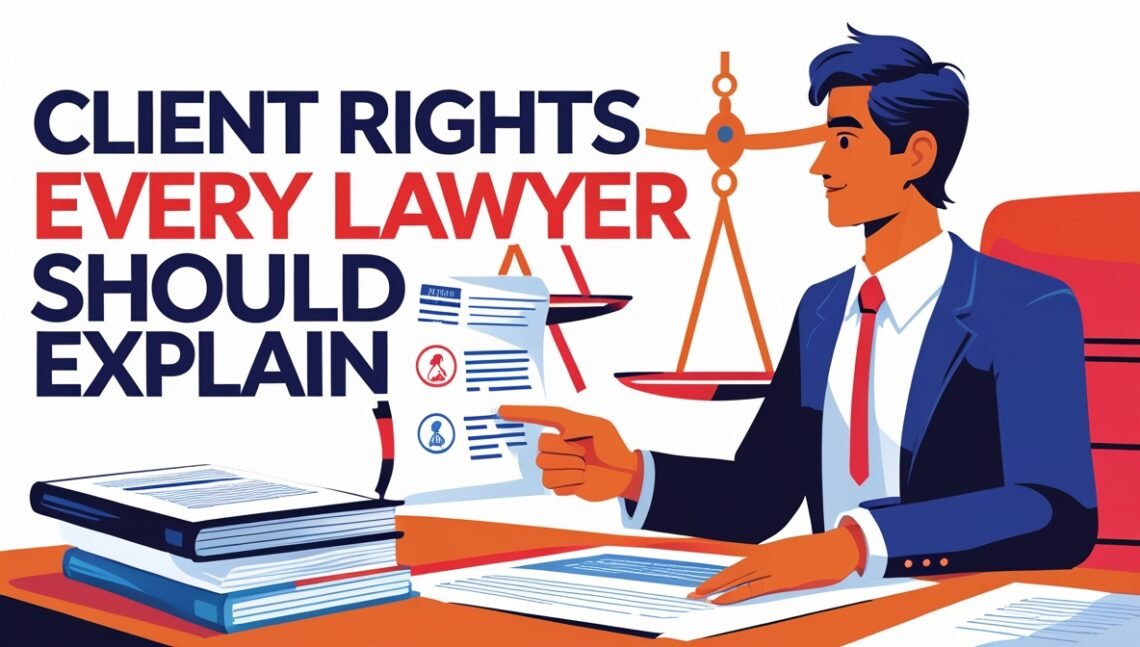You know, something I realized early on in my career is that being a lawyer isn’t just about knowing the law. It’s about being a person. A lot of clients, when they first walk into your office, they’re scared. They don’t know the first thing about the legal system. To them, it’s this big, scary machine. And you? You’re the person they’re trusting to guide them through it.
I’ve had my share of uncomfortable moments. The client just didn’t understand the fee agreement, no matter how many times I explained it. The one who felt left out of the loop because I forgot to tell them about a routine court filing. It’s on us. We can’t just assume they know their rights. It’s our job to spell them out, plain and simple. Not because the bar says we have to, but because it’s the right thing to do. So, let’s talk about a few of those rights we absolutely, positively need to be explaining.
Making Sure They Get It:
Let’s just get the uncomfortable part out of the way first. Money. The fee agreement. It’s a huge source of friction, and honestly, it’s almost always our fault. We throw around terms like “contingency” and “hourly rate” like everyone understands them. They don’t.
- Don’t Just Give Them the Document; Explain It: When I go over a retainer agreement, I don’t just point to the signature line. I pull up a chair, and I walk them through it, paragraph by paragraph. “This here,” I’ll say, “is my hourly rate. And what that means is, I keep track of every minute I spend on your case. A phone call? That’s time. A quick email? Yep, that too. I want you to know exactly how I’m billing you, so there are no surprises.” If it’s a flat fee, I make it crystal clear what’s included and what happens if something unexpected comes up. With a contingency fee, I literally draw them a little diagram showing what percentage we get and when. It’s about building trust from day one, not just getting a signature.
The “Tell Me What’s Happening” Right:
This one seems so simple, but I see so many lawyers mess it up. We’re in the middle of a case, and we get an email from opposing counsel or a notice from the court. We read it, we understand it, and we file it away, thinking, “I’ll tell the client later.” Don’t do that.
- Make Them Part of the Team: I learned the hard way that clients just want to feel like they’re in the loop. It doesn’t have to be a big production. A quick email, a short text message, a quick phone call. Something like, “Hey, just letting you know we got a response from the other side. Nothing new to worry about, but I’ll update you next week.” That simple act lets them know you’re working on their case and they’re not just a file sitting on your desk. I also make a point of explaining the strategy. Why are we doing this? Why are we not doing that? A client who understands the game plan is a client who trusts you.
The Right to Be the Boss of Their Own Case:
I think we, as lawyers, sometimes get too invested in “winning.” We see the legal system as a chessboard, and we want to checkmate the other side. But we have to remember, it’s not our life. It’s theirs.
- Advise, Don’t Command: I once had a client who was facing a big financial decision, and they got a settlement offer that I thought was perfect. It was a good deal for them, and I told them so. I laid out all the reasons why they should take it. But after thinking about it, they told me no. They wanted to go to trial. My first reaction was frustration. But then I remembered: it’s not my call. My job was to give them my best advice, to show them the pros and cons, but the final decision was theirs. We have to respect that. We can’t get so focused on our own strategy that we forget who we’re actually working for.
The Confidentiality Agreement:
This is probably one of the most powerful rights a client has, and it’s something they need to hear directly from you. They have to know that what they say to you, in the context of legal advice, is sacred. It is protected.
- Tell Them What’s Protected (and What’s Not): I make a point of explaining attorney-client privilege to every new client. “Anything you tell me about your case, about your life, is confidential. I can’t be forced to talk about it.” I also tell them the limits. I make it clear that if they tell me they’re planning to commit a crime, I have a duty to disclose that. I also talk about third parties. If they have a friend or a family member on the phone with us, that confidentiality can be lost. I’ve seen it happen. It’s our job to prevent that by explaining the rules from the start.
When You’re Not the Right Fit:
This is a tough one, but it’s part of the job. A client has a right to competent representation. And competence isn’t just about being smart. It’s about knowing your limits.
- Don’t Fake It: I once had a potential client come to me with a really specific tax law problem. Now, I know a little about tax law, but I’m not a tax lawyer. I had a choice: I could take the case and maybe figure it out, or I could be honest with them. I told them, “Look, this is a little outside my expertise. I want you to get the best possible help, and I’m not the right person for this case. But I can refer you to someone who is.” It was a hard conversation, but it was the right one. A client has a right to a lawyer who knows what they’re doing.
The Right to Be Treated Like a Human Being:
This sounds simple, but you’d be surprised. A client is not a file number. They are a person who often deals with a scary or difficult situation.
- Listen to Them: I always make sure I listen to what a client is really saying, not just the legal details. Are they anxious? Are they angry? Are they scared? They have a right to a lawyer who hears them, who returns their calls, and who treats them with dignity and respect. That’s the foundation of a good attorney-client relationship. You can have the smartest lawyer in the world, but if they don’t treat you like a person, what good are they?
Conclusion:
Our job isn’t just to be legal experts. It’s to be guides. The legal system is a confusing, intimidating place, and our clients are putting their trust in us to get them through it. By clearly explaining these fundamental rights, from how we’re going to bill them to how we’re going to communicate, we’re not just doing our professional duty. We’re building a relationship based on trust and respect. And in my experience, that kind of relationship is the most powerful tool a lawyer can have.
FAQs:
1. Do I have to explain every single fee on my bill?
Yes, a clear and honest breakdown of all charges is a client’s right.
2. Can my lawyer make decisions for me without my permission?
No, a lawyer must get your permission on all major decisions, like settling a case.
3. What does “attorney-client privilege” mean for me?
It means your communications with your lawyer are confidential and legally protected.
4. How often should my lawyer be updating me on my case?
Your lawyer should inform you of any significant developments in your case promptly.
5. Can my lawyer refuse to take my case?
Yes, a lawyer can refuse a case if it is outside their area of expertise.
6. Do I have the right to fire my lawyer?
Yes, you have the right to terminate your attorney-client relationship at any time.

